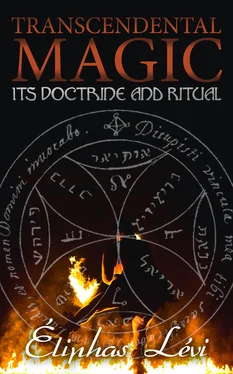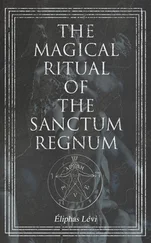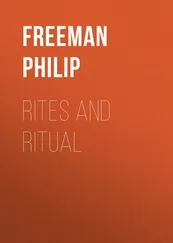To dispose of it, we must, like the predestined woman, set our foot upon its head.
In the elementary world water corresponds to the kabalistic woman and fire to the serpent. To subdue the serpent, that is, to govern the circle of the Astral Light, we must place ourselves outside its currents: in other words, we must isolate ourselves. For this reason Apollonius of Tyana wrapped himself completely in a mantle of fine wool, setting his feet thereon and drawing it over his head. Then he bent his back in semicircular fashion, and closed his eyes, after performing certain rites – probably magnetic passes and sacramental words, designed to fix imagination and determine the action of will. The woollen mantle is of great use in Magic and was the common conveyance of sorcerers on their way to the Sabbath, which proves that the sorcerers did not really go to the Sabbath, but the Sabbath came to the sorcerers, when isolated in their mantle, and brought before their TRANSLUCID images analogous to their magical preoccupations, combined with reflections of all kindred acts accomplished previously in the world.
This torrent of universal life is represented also in religious doctrines by the expiatory fire of hell. It is the instrument of initiation, the monster to be overcome, the enemy to subdue; it is this which brings to our evocations and to the conjurations of Goetic Magic such swarms of larvae and phantoms. Therein are preserved all the fantastic and fortuitous assemblages of forms which people our nightmares with such abominable monstrosities. To be sucked down by this whirl-ing stream is to fall into abysses of madness, more frightful than those of death; to expel the shades of this chaos and compel it to give perfect forms to our thoughts – this is to be a man of genius; it is to create, it is to be victorious over hell! The Astral Light directs the instincts of animals and offers battle to the intelligence of man, which it strives to pervert by the enticements of its reflections and the illusion of its images. It is a fatal and inevitable operation, directed and made still more calamitous by elementary spirits and suffering souls, whose restless wills seek out sympathies in our weakness and tempt us, but not so much to destroy us as to win friends for themselves.
That book of consciences which, according to Christian doctrine, shall be opened at the last day, is no other than the Astral Light, which preserves the impress of every logos, that is to say, of all actions and all forms. Our acts modify our magnetic respiration in such a way that a seer, meeting any person for the first time, can tell whether he is innocent or criminal, and what are his virtues or his crimes. This faculty, which belongs to divination, was called by the Christian mystics of the early Church the discernment of spirits.
Those who abdicate the empire of reason and permit their wills to wander in pursuit of reflections in the Astral Light, are subject to alternations of mania and melancholy which have originated all the marvels of demoniacal possession, though it is true, at the same time, that by means of these reflections impure spirits can act upon such souls, make use of them as docile instruments and even habitually torment their organism, wherein they enter and reside by obsession, or embryonically. These kabalistic terms are explained in the Hebrew book of the Revolution of Souls, of which our thirteenth chapter will contain a succinct analysis. It is therefore extremely dangerous to make sport of the Mysteries of Magic; it is above all excessively rash to practise its rites from curiosity, by way of experiment and as if to exploit higher forces. The inquisitive who, without being adepts, busy themselves with evocations or occult magnetism, are like children playing with fire in the neighbourhood of a cask of gunpowder; sooner or later they will fall victims to some terrible explosion.
To be isolated from the Astral Light it is not enough to envelop one's self in a woollen fabric; we must also, and above all, impose absolute tranquillity on mind and heart; we must have quitted the world of passions and be assured of perseverance in the spontaneous operations of an inflexible will. We must reiterate frequently the acts of this will, for, as we shall see in the introduction to the “Ritual”, it is by acts only that confidence is assured to the will, as the power and perpetuity of religions depend on their Rites and Ceremonies.
There are intoxicating substances, which, by increasing nervous sensibility, exalt the power and consequently the allurements of astral representations; by the same means, but pursuing a contrary course, spirits may be terrified and disturbed. These substances, of themselves magnetic and magnetized further by operators, are what people term philtres and enchanted potions. But we shall not enter here upon this dangerous aspect of the practice, which Cornelius Agrippa himself terms venomous Magic. It is true that there are no longer pyres for sorcerers, but always, and more than ever, are there penalties dealt out to malefactors.
Let us confine ourselves therefore to stating, as the occasion offers, the reality of such power.
To direct the Astral Light we must understand also its twofold vibration, as well as the balance of forces termed magical equilibrium, expressed in the Kabalah by the senary. Considered in its first cause, this equilibrium is the will of God; it is liberty in man and mathematical equilibrium in matter. Equilibrium produces stability and duration. Liberty generates the immortality of man,” and the will of God gives effect to the laws of Eternal Reason. Equilibrium in ideas is reason and in forces power. Equilibrium is exact; fulfil its law, and it is there; violate it, however slightly, and it is destroyed. For this reason nothing is useless or lost. Every utterance and every movement are for or against equilibrium, for or against truth, which is composed of for and against conciliated, or at least equilibrated. We shall state in the introduction to the “Ritual” how magical equilibrium should be produced, and why it is necessary to the success of all operations.
Omnipotence is the most absolute liberty; now, absolute liberty cannot exist apart from perfect equilibrium. Magical equilibrium is hence one of the first conditions of success in the operations of science, and must be sought even in occult chemistry, in learning to combine contraries without neutralizing them by one another. Magical equilibrium explains the great and primeval mystery of the existence and relative necessity of evil. This relative necessity gives, in Black Magic, the measure of the power of demons or impure spirits, to whom virtues practised upon earth are a source of increased rage and apparently of increased power. At the epochs when saints and angels work miracles openly, sorcerers and fiends in their turn operate marvels and prodigies. Rivalry often creates success; we lean upon that which resists.
VII  G
G
Table of Contents
CHOKMAH DOMUS GNOSIS
THE septenary is the sacred number in all theogonies and in all symbols, because it is composed of the triad and the tetrad. The number seven represents magical power in all its fullness; it is the mind reinforced by all elementary potencies; it is the soul served by Nature; it is the SANCTUM REGNUM mentioned in the Keys of Solomon and represented in the Tarot by a crowned warrior, who bears a triangle on his cuirass and is posed upon a cube, to which two sphinxes are harnessed, straining in opposite directions, while their heads are turned the same way. This warrior is armed with a fierysword and holds in his left hand a sceptre surmounted by a triangle and a sphere. The cube is the Philosophical Stone; the sphinxes are the two forces of the Great Agent, corresponding to JAKIN and BOAZ, the two Pillars of the Temple; the cuirass is the knowledge of Divine Things, which renders the wise man invulnerable to human assaults; the sceptre is the Magic Wand; the fierysword is the symbol of victory over the deadly sins, seven in number, like the virtues, the conceptions of both being typified by the ancients under the figures of the seven planets then known. Thus, faith – that aspiration towards the infinite, that noble self-reliance sustained by confidence in all virtues – the faith which in weak natures may degenerate into pride, was represented by the Sun; hope, the enemy of avarice, by the Moon; charity, in opposition to luxury, by Venus, the bright star of morning and evening; strength, superior to wrath, by Mars; prudence, hostile to idleness, by Mercury; temperance, opposed to gluttony, by Saturn, who was given a stone instead of his children to devour; finally, justice, in opposition to envy, by Jupiter, the conqueror of the Titans. Such are the symbols borrowed by astronomy from the Hellenic cultus. In the Kabalah of the Hebrews, the Sun represents the angel of light; the Moon, the angel of aspirations and dreams; Mars, the destroying angel; Venus, the angel of loves; Mercury, the angel of progress; Jupiter, the angel of power: Saturn, the angel of the wilderness.
Читать дальше

 G
G










